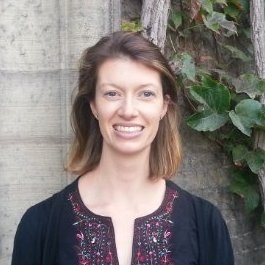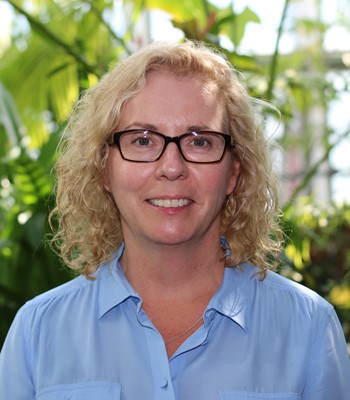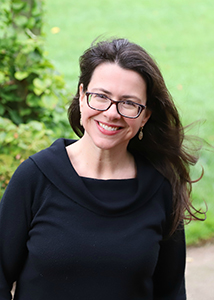Our faculty are leaders in their fields who have won teaching awards and have demonstrated excellence in online education.
The Advisory Committee and director of the Online Learning Academy have deep experience in online teaching and curricular design. Through sharing their expertise and passion, they are focused on supporting instructors and students in developing a seamless online experience.
About the Academy Director
 Don Boyes is an award-winning professor in the University of Toronto’s Department of Geography & Planning who is passionate about the role of technology in teaching and how it can be leveraged to transform the learning experience for students. Boyes teaches a number of courses using face-to-face, online and hybrid modes. He also teaches four online courses to thousands of students on Coursera, which collaborates with more than 190 world-class universities and companies to offer online courses, certificates and degrees.
Don Boyes is an award-winning professor in the University of Toronto’s Department of Geography & Planning who is passionate about the role of technology in teaching and how it can be leveraged to transform the learning experience for students. Boyes teaches a number of courses using face-to-face, online and hybrid modes. He also teaches four online courses to thousands of students on Coursera, which collaborates with more than 190 world-class universities and companies to offer online courses, certificates and degrees.
Expertise in Online Teaching
Boyes reaches students province-wide through eCampusOntario, a not-for-profit corporation funded by the Government of Ontario to make online and technology-enabled learning available to publicly funded colleges and universities. At the Online Learning Academy, Boyes is building a team of professors and instructors from across the Faculty with deep experience in online teaching to advise their peers on how best to develop and deliver high-quality, online education.
Boyes created and currently teaches a highly rated Coursera specialization, consisting of four courses:
- Introduction to GIS Mapping
- GIS Data Acquisition and Map Design
- Spatial Analysis and Satellite Imagery in a GIS
- GIS, Mapping, and Spatial Analysis Capstone
Vision for Online Learning
“I’m excited to lead the Academy,” says Boyes. “Even without the changes made necessary by the pandemic, this is a chance to explore innovative teaching tools and methods that can create better learning opportunities for students.”
Impact for Students
“Our goal is to help instructors provide the best possible online learning experience for their students, regardless of where those students may be or the circumstances in which they find themselves,” says Boyes. “Students are facing enormous challenges in their lives. We want to make their education not only less stressful, but actually more engaging, effective and enjoyable.”
OLA Advisory Committee
 Jennifer Campbell is a professor, teaching stream, in the Department of Computer Science at U of T. She was awarded the Faculty of Arts & Science Outstanding Teaching Award in 2014, co-developed two Coursera massive open online courses on learning to program, and co-authored a textbook on introductory programming. She co-founded the U of T Second-year Learning Community program and is a member of the U of T Computer Science Education research group.
Jennifer Campbell is a professor, teaching stream, in the Department of Computer Science at U of T. She was awarded the Faculty of Arts & Science Outstanding Teaching Award in 2014, co-developed two Coursera massive open online courses on learning to program, and co-authored a textbook on introductory programming. She co-founded the U of T Second-year Learning Community program and is a member of the U of T Computer Science Education research group.
Expertise in Online Teaching
Campbell has been teaching flipped and online courses since 2013, and co-developed Computer Science’s flipped introductory programming course with active learning and online components, including instructional videos and exercises. She also developed an online version of the course, funded through the Ontario Online Initiative. The introductory course is taken in the flipped and online formats by more than 3,000 students each year.
Vision for Online Learning
Campbell is excited to work with colleagues on how to deliver courses online in a way that best suits their teaching styles and the learning objectives for their courses. “There is no one-size-fits-all model for online courses and I look forward to collaborating with others to identify models of instruction, tools and techniques that aid with the transition to online learning for students and instructors alike,” she says.
As the team strives to develop effective online courses, Campbell will emphasize the importance of fostering a positive learning environment. “I believe quality instructor-learner and learner-learner interactions significantly enhance the learning experience, and I look forward to bringing my experience with online learning and teaching to U of T.”
Impact for Students
Over the past few weeks, students, instructors and staff have been adapting to remote teaching and learning. Behind the scenes, within U of T’s departments and professional networks, faculty have worked with each other and with students as learning shifted online. “The newly formed Online Learning Academy will become a central community of practice for instructors and instructional designers throughout A&S as we plan for future remote course offerings,” Campbell says. “We are coming together to share our knowledge and learn from each other, so together we can provide the best online learning experience possible for our students.”
 Jessica Hill is an assistant professor, teaching stream in the Department of Molecular Genetics. She completed her PhD in the department studying the evolution of drug resistance in fungal pathogens. This was followed by a post-doctoral fellowship at Sickkids examining people’s understanding of cancer genetics. Her research interests have since broadened to include best practices in online education in the sciences, effective teaching in large courses, improving student engagement in online courses and adapting modules for teaching medical genetics and microbiology in various settings. Hill is the creator of and course coordinator for Introduction to Medical Genetics, and the course coordinator for Introduction to Medical Microbiology.
Jessica Hill is an assistant professor, teaching stream in the Department of Molecular Genetics. She completed her PhD in the department studying the evolution of drug resistance in fungal pathogens. This was followed by a post-doctoral fellowship at Sickkids examining people’s understanding of cancer genetics. Her research interests have since broadened to include best practices in online education in the sciences, effective teaching in large courses, improving student engagement in online courses and adapting modules for teaching medical genetics and microbiology in various settings. Hill is the creator of and course coordinator for Introduction to Medical Genetics, and the course coordinator for Introduction to Medical Microbiology.
Expertise in Online Learning
“I teach large, asynchronous online courses that service a variety of students across disciplines,” says Hill. “I have experience with online educational tools such as Peerscholar and Crowdmark and have recently begun implementing some flipped classes, a type of blended learning in which students are introduced to content at home and practice working through it face-to-face at school.”
Vision for Online Learning
“I am excited to bring my experience with teaching large courses to the Academy,” she says. “I spend a lot of time thinking about how to create and maintain student engagement, and how to develop meaningful assessments given course parameters. I’ll be happy to share my experiences of what has worked – and what hasn’t.”
Impact for Students
Students will benefit tremendously from faculty members who have thought deeply about the student experience in online courses, gained valuable insight from student feedback and are motivated to share their knowledge with all instructors to enable all online courses at the university to become enriching learning experiences.
 Kyoungrok Ko is an associate professor, teaching stream, in the Department of East Asian Studies. Ko teaches Korean language courses and coordinates the Korean language program. Before joining the University of Toronto, he taught Korean language and literature at the Ohio State University, Oberlin College, and Concordia Language Village in the U.S. His interests include integrating pop culture and technology into foreign/second language education.
Kyoungrok Ko is an associate professor, teaching stream, in the Department of East Asian Studies. Ko teaches Korean language courses and coordinates the Korean language program. Before joining the University of Toronto, he taught Korean language and literature at the Ohio State University, Oberlin College, and Concordia Language Village in the U.S. His interests include integrating pop culture and technology into foreign/second language education.
Expertise in Online Teaching
Ko has developed and taught the flipped classroom, a type of blended learning in which students are introduced to content at home and practice working through it at school, for the introductory Korean language course with the help of ATLAS fund since 2017. The course has been using online lectures and face-to-face tutorial sessions. His familiarity with the needs of language instructors will help him to contribute to U of T’s online learning objectives from that perspective.
Vision for Online Learning
The pandemic has created an opportunity for instructors to think seriously about the development of new education delivery methods. “I am so pleased to help my colleagues by sharing my experience in developing and teaching inverted courses using online resources for the last two years,” he says. “Personally, I need to develop a range of courses with a 100 per cent online delivery. The Online Learning Academy will give me and my colleagues valuable opportunities to develop online-based, innovative curriculum.”
Impact for Students
“Regardless of the current challenge, we always need to develop new curricula and innovative teaching methods to meet the needs of learners of the new — and extremely tech savvy — generation,” he says. “Large universities like U of T face challenges in dealing with the needs of individual students. We need to develop online learning curricula that is student-centred and takes care of student needs in terms of time and location while delivering high-quality education.”
 Jennifer Murdock is a professor, teaching stream, in the Department of Economics, where she has taught since 2004. She has received a number of prestigious teaching awards, including the U of T President’s Teaching Award in 2018, the U of T Faculty of Arts & Science Outstanding Teaching Award in 2014, and the Dean’s Excellence/Small Group Award in 2010 and each year from 2013 through 2019. The profound and direct impact professors have on students’ learning experiences fuels her passion in her own teaching, in collaborating with teaching colleagues and in recruiting new professors.
Jennifer Murdock is a professor, teaching stream, in the Department of Economics, where she has taught since 2004. She has received a number of prestigious teaching awards, including the U of T President’s Teaching Award in 2018, the U of T Faculty of Arts & Science Outstanding Teaching Award in 2014, and the Dean’s Excellence/Small Group Award in 2010 and each year from 2013 through 2019. The profound and direct impact professors have on students’ learning experiences fuels her passion in her own teaching, in collaborating with teaching colleagues and in recruiting new professors.
Expertise in Online Teaching
In addition to well-designed Quercus sites that facilitate student engagement, she uses graded online assessments along with traditional tests and exams, with tools such as Quizzes in Quercus and Crowdmark. She led the transition of an economics data analysis module from physical computer labs to an online format that has been completed by 1,000 students each year.
Vision for Online Learning
Murdock is excited to join the OLA because she knows meaningful teaching collaboration leads to better learning experiences for students. With colleague Kripa Freitas, she envisioned and launched the Teaching and Learning Community of Practice, Department of Economics (Economics CoP) in Summer 2016 and the companion —and entirely virtual — Economics CoP on Quercus in March 2020. “Sustained and substantive collaboration with our creative and accomplished colleagues helps us all develop innovative and effective teaching practices,” she says.
Impact for Students
“Building productive teaching networks within and across disciplines, where the best online practices go viral among colleagues who trust and respect each other, creates a robust community that helps our students continue to learn and thrive in uncertain and shifting environments,” Murdock says. “Collectively, we have the knowledge and experience to navigate the challenges of emergency remote teaching and to continue to provide meaningful learning experiences for our students.”
 Melody Neumann is an associate professor, teaching stream, in the Department of Cell & System Biology, and has taught since 2003. She has developed and taught inverted and fully online courses. Neumann has long been passionate about using technology to improve student learning, and recently developed the award-winning active-learning tool Team Up! The secure browser-based app enables students to work together in class in real-time and provides immediate feedback to both instructors and students. The app can be used in any class — including online — where instructor-student and student-student interactions are more challenging. She has received a number of teaching awards, including the Dean’s Outstanding Teaching Award in 2015, and came first place in the IMS Global 3rd Annual App Challenge, Institutional App category, in 2016.
Melody Neumann is an associate professor, teaching stream, in the Department of Cell & System Biology, and has taught since 2003. She has developed and taught inverted and fully online courses. Neumann has long been passionate about using technology to improve student learning, and recently developed the award-winning active-learning tool Team Up! The secure browser-based app enables students to work together in class in real-time and provides immediate feedback to both instructors and students. The app can be used in any class — including online — where instructor-student and student-student interactions are more challenging. She has received a number of teaching awards, including the Dean’s Outstanding Teaching Award in 2015, and came first place in the IMS Global 3rd Annual App Challenge, Institutional App category, in 2016.
Expertise in Online Teaching
Neumann developed one of the first inverted classes in the Faculty of Arts & Science and has been successfully teaching a fully online course for seven years. “To me, a successful online course is one with very high completion rates where students are highly engaged while achieving the course learning outcomes,” she says. “My approach has included evidence-based online course design, video and animation development, online assessment development and synchronous online learning components that involve group work using webinar and Team Up! software.”
Vision for Online Learning
Having once been a commuting undergraduate student with a part-time job, Neumann deeply appreciates the stresses and complexities of undergraduate student life and feels online-learning can provide flexible learning alternatives for many students throughout the course of their programs — not just during a pandemic. “I have designed my online courses to ensure they’re accessible, and that students are engaged and come away empowered with knowledge and transferrable skills,” she says. “Many of my students remark that they had more interaction with me, their TAs and their classmates online than they ever did in many of their traditional classes.”
Impact for Students
Through the Online Learning Academy, Fellows will share evidence-based practices for online course design that is customized specifically for the discipline and success of U of T students. “Specifically, the Academy is here to share knowledge and expertise across disciplines, in everything from online course design to fair assessment, thereby helping instructors empower their students to be successful in their learning and achieve their academic potential,” she says.

Nicholas Provart has been a professor in the Department of Cell & Systems Biology since 2002. His lab develops bioinformatics tools to identify novel aspects of plant biology, especially in the area of plant stress biology. He also teaches four courses on Coursera and has taught two popular upper year courses at the University of Toronto as inverted classes for several years.
Expertise in Online Teaching
Provart has worked extensively with the U of T’s Centre for Teaching Support & Innovation since 2013 to develop his successful Coursera courses, which are now part of a four-course specialization in Plant Bioinformatics. These hands-on lab courses combine practical work using powerful online tools with mini-lectures providing theoretical background material.
Vision for Online Learning
Provart is excited to bring his knowledge of online course delivery to other science courses at the University of Toronto. How can we enable flexible learning at a student’s own pace, yet maintain a sense of belonging to a class? His years of experience have helped develop a deeper understanding of what works and what doesn’t.
Impact for Students
“In my mind, the Online Learning Academy is a natural progression of efforts that have been underway at the University to be more open and accessible,” he says. “Delivering material in ways that help facilitate this will be beneficial for students, both from a learning perspective and in terms of balancing the demands of academic life.
 Franco Taverna is an associate professor, teaching stream, who has taught with the Department of Human Biology since 2007. He has coordinated the 300 and 400 series research project courses offered by Human Biology for more than a decade, supporting students through workshops on research, writing, presenting and career development skills. He offers popular community-engaged, learning-based courses that help students develop career-oriented skills, as well as skills in project design and development, and leadership and collaboration with community partners. He also teaches the Introduction to Neuroscience course for Human Biology both in person and online. He was the recipient of the Faculty of Arts & Science Outstanding Teaching Award in 2019.
Franco Taverna is an associate professor, teaching stream, who has taught with the Department of Human Biology since 2007. He has coordinated the 300 and 400 series research project courses offered by Human Biology for more than a decade, supporting students through workshops on research, writing, presenting and career development skills. He offers popular community-engaged, learning-based courses that help students develop career-oriented skills, as well as skills in project design and development, and leadership and collaboration with community partners. He also teaches the Introduction to Neuroscience course for Human Biology both in person and online. He was the recipient of the Faculty of Arts & Science Outstanding Teaching Award in 2019.
Expertise in Online Learning
For more than five years, Taverna has taught an online version of Introduction to Neuroscience, one of the first courses to be developed at the University to provide synchronous online teaching using large-scale webinar software. He has received numerous grants for developing online courses as well as teaching and learning methods such as online student engagement for synchronous environments, online group work using Team Up! and online testing methods.
Vision for Online Learning
His research indicates many students prefer and thrive within an online environment, particularly one that is synchronously delivered. Students love the convenience and accessibility, and often say they feel more connected to the professor and classmates because of the specific teaching methods used such as online audio/video or chat-based Q/A, virtual breakout rooms and group work, whole class interaction on whiteboards and many others. “Students love the flexibility of being able to attend class ‘in their pajamas’ and having authentic recordings of class lectures,” he says. “We have hosted students in our online classes from all over the world simultaneously, and the live webinar format is a welcome opportunity to be social and connected with professors, teaching assistants and classmates.”
Impact for Students
With the appropriate research-informed structure and delivery method, online courses can be as effective as face to face courses for learning and engagement while providing an opportunity for remote learning. “For students, online courses bring convenience, accessibility, flexibility and options,” he says. “No longer do students have to live on campus or attend classes in person.”
 Bethany White is an associate professor, teaching stream, and Associate Chair for Undergraduate Studies in Statistics in the Department of Statistical Sciences. While an assistant professor at the University of Western Ontario, she received a Faculty of Science Award for Excellence in Undergraduate Teaching. She has earned several university teaching certifications and has led training and professional development related to teaching and learning for faculty, graduate students and TAs. She has also served on organizing committees for statistics and science education workshops and conferences in Canada and the U.S.
Bethany White is an associate professor, teaching stream, and Associate Chair for Undergraduate Studies in Statistics in the Department of Statistical Sciences. While an assistant professor at the University of Western Ontario, she received a Faculty of Science Award for Excellence in Undergraduate Teaching. She has earned several university teaching certifications and has led training and professional development related to teaching and learning for faculty, graduate students and TAs. She has also served on organizing committees for statistics and science education workshops and conferences in Canada and the U.S.
Expertise in Online Teaching
White brings with her 15 years of experience teaching small and large courses at the undergraduate and graduate level, including fully online and hybrid courses. Her research interests involve the impact of technology-enhanced activities on student learning and attitudes toward statistics. “I’ve always been an early adopter of online learning technologies including personal response systems, online quizzes and surveys, discussions, simulations and interactive online modules,” she says. “I have also been an evaluator and first adopter when transitioning to new institutional Learning Management Systems, such as our move to Quercus.”
White has also led two eCampus Ontario projects, including development of a large enrolment course at the University of Western Ontario, and a set of open online modules hosted by the University of Toronto to augment introductory statistics training by building students’ skills using R to analyze and interpret scientific data.
Vision for Online Teaching
“It’s all about mindset! I see this as an opportunity for all of us to connect, to learn and to grow together,” she says. “We have some truly amazing instructors and they really care about their students’ learning, progress and well-being. I am really looking forward to collaborating with them and doing what I can to help them create the best learning experiences possible for their students.”
Impact for Students
This will be a very different experience for students new to online learning, and a little nervousness is perfectly normal, she says. “But, if you stay organized, regularly engage with the course activities and connect with your instructor, TAs and other students in the class, I know you will be pleasantly surprised at how much you enjoy your learning experience!” Learning online provides students and faculty alike the opportunity to connect with others and find a U of T community despite geographical constraints. “My online students have always appreciated the flexibility — in terms of time and location — that eLearning offers and they have even reported getting to know people in their fully online courses better than in on-campus courses,” she says.

